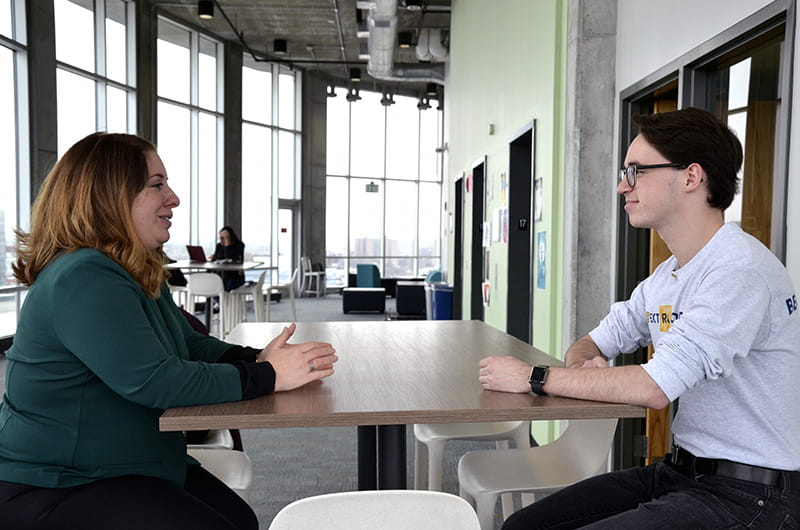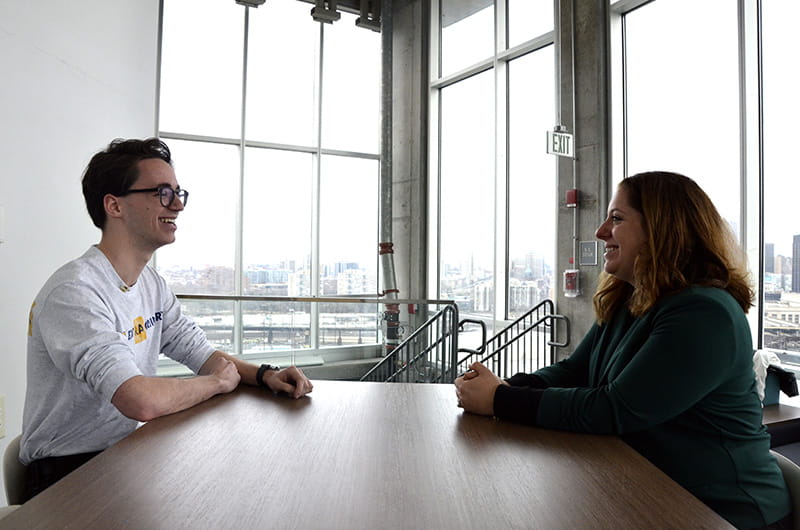Mythbusters: Building Community with Residence Life

Melissa DePretto Behan, EdD, senior executive director of Student Life at Drexel University, explains how she oversees the “three C’s” for Drexel students: community, conduct and crisis.
And, when you think about it, these are three pretty important and interconnected considerations for Drexel students, no matter what letter they start with.
“For obvious reasons, those three are pretty tightly connected, which is really kind of a good thing for our students,” DePretto Behan said. “We’re able to tap into what supports they need really quickly. … It’s a pretty tight chain of communication, which I think is to the students’ benefit.”
That Residence Life communication web has Drexel’s more than 100 student Resident Assistants (RAs) at the base, and then its staff of Assistant Directors and Resident Directors (AD/RDs) who all work to support students in their dorms as well as connect them with the many resources available on campus. But all this doesn’t guarantee that the web doesn’t get tangled, and that misconceptions don’t arise among students about the role Residence Life and its employee network play in their Drexel experience.
So, DrexelNow set out to see what these myths might be with the help of Danny Inglis, a third-year architectural and civil engineering student who is also an RA in Millennium Hall. Here are five such common myths about Residence Life and Inglis and DePretto Behan’s reasoning around what makes them untrue.

- Residence Life only cares about my life on campus
Inglis said the biggest reason he became an RA was not just to help his fellow students get acquainted to campus, but to living in the city at large.
“I’m not from a city, so I had to make that transition,” he said. “I want to help make sure students can get the vibe of Philly and the different neighborhoods, and understand the various restaurants and things that are available.”
This goes against what some students might think: that their RAs, and even Residence Life as a whole, are only here to help them with things that are not dorm-related.
“There’s a perception that RAs are most concerned about the floor, and your issues, questions, concerns about the floor or even just Drexel in general, like classes, which are all reasonable things to be concerned about,” Inglis said. “But … Philly is such an integral part in Drexel’s community that it would be almost hard to separate the two.”
DePretto Behan agrees with this sentiment, adding that Residence Life encourages RAs to become the bridge between Drexel students and the city by taking them on SEPTA, as well as to different neighborhoods outside of University City and Center City.
“It’s not all about the Liberty Bell and LOVE Park,” she said. “There are so many great places to eat and really rich cultural neighborhoods, and the city is so accessible in terms of you can walk anywhere, you can bike anywhere. It’s a really close-knit city. … It’s really easy to feel like you’re part of the city and part of the community, not just at Drexel but in Philadelphia. So, I think that’s a huge part of what we do.”
In addition to everything that’s happening on campus, DePretto Behan said she and her colleagues want residential students to get out and experience everything that Drexel and Philadelphia have to offer.
“We don’t want them to sit in their residence hall all day,” she said.
- Living on campus can feel unsafe
Whether they are chilling in their residence hall or walking around on campus, there are several layers of security working together on campus to make students feel safe no matter what they’re doing. This includes everything from Residence Life’s strict guest policy in its residence halls to the emergency “blue light” telephone system, the Drexel Guardian app and Public Safety’s escort walking service.
“Safety is a really big issue, but I have very seldom felt unsafe on campus,” said Inglis.
This is despite the fact that campus safety is usually one of the biggest questions he’ll get from students and parents during Welcome Week, especially if they themselves are not from the area.
“They hear Philly and they’re like, ‘Oh, it’s a dangerous city’ or they will ask for boundaries, like ‘What street should I not go past,’” Inglis said.
DePretto Behan said it’s important for students to keep in mind that Drexel is in the middle of the city and is not a fenced-off campus, but this is why Residence Life puts a large focus on knowing who is in the residence halls at all times, with front desks that are manned 24-7 by either student workers or representatives from Drexel Public Safety.
“Even if we weren’t in a city, just navigating the world, you have to have common sense and you need to be paying attention to what’s going on around you, remembering where you parked, and just sort of using good adulting skills,” DePretto Behan added. “Those are the best ways to keep yourself safe.”
- Residence Life doesn’t support me if I live off-campus
And just like they do everything to ensure resident students are safe and secure, Residence Life is also the first layer of support if students need assistance, whether they live on campus or not
Inglis relayed an example of a friend who had an incident on campus, and even though she didn’t live in a residence hall, she was contacted by an AD/RD afterwards to make sure she was OK.
“The AD/RDs look out for all students,” he said. “While the majority of Housing and Residence Life is very first-year oriented, it is not only first-year oriented.”
DePretto Behan explained that AD/RDs are the first responders in the campus’ crisis management protocol, so if anything happens involving a Drexel student and police or medical transport, chances are that Residence Life will know about and act on it.
“That’s sort of a function of Student Life, and the AD/RDs help power that,” she said. “But, I think generally, more and more the whole Residence Life team is just here for student support. I think our focus is obviously on the students on campus, but I think because we are on the ground, literally living with the students … the whole staff takes our role [of] being there to support students very seriously. So, we’re focused definitely on residential students, but we absolutely extend that out to everybody.”
- RAs are only present in the residence halls to enforce rules
This goal of student support extends down to the Resident Assistants that students living on campus are interacting with on a weekly, or even daily, basis. But Inglis said that some students may think an RA’s only goal is to enforce rules.
“Residents may not see RAs as an all-encompassing resource, or even fully as a person, really,” he said. “I think sometimes RAs can be perceived as just the rule enforcer where it’s like, you’re also a student, you’re involved in XYZ clubs, you have a social life.”
And while it is part of the job description for the competitive student position (Drexel usually gets about 400 applications to fill 30 vacant RA spots annually), DePretto Behan said enforcing the rules and getting student residents in trouble is definitely not the reason that Drexel students become RAs.
“That’s sort of [what people think because of] what’s in the movies: the RA who is laying down the law,” she said. “But they want to be RAs because they really value their relationships, they value the community, they’re excited for other people to have a good experience at Drexel. … It’s not about following the rules, it’s about making sure that people are safe so we can have a really positive community.”
DePretto Behan added that it’s actually a lot of work for RAs to enforce rules, as Residence Life has RAs write up incident reports for everything from student infractions to maintenance requests. In fact, the goal is that, instead of enforcing rules, that RAs work with residents to provide resources and build community so that no one even breaks the rules, and instead they are known, understood and respected.
“While we do enforce rules, there is so much more to being an RA than enforcing policies,” Inglis added. “[There’s] a lot of supporting residents and making sure they’re doing well emotionally, physically, that they’re taking care of themselves, that they’re building a community with Drexel, with their friends and with the floor."
- RAs can only help me with certain issues
Along with caring for their residents, emotionally and physically, Inglis said he wants to make sure they also know that RAs are there for so much more than diverting roommate conflict and recommending restaurants to try. Inglis has even gone so far as to help one of his residents build a printer for their dorm room.
“As an engineer, I love building things and fixing things, so I was like, ‘Yeah, I’ll totally take a crack at it,’” he remembered. “I was in a suite in the common area working with the resident to get this printer to work.”
DePretto Behan said though Residence Life touts RAs as their ground-zero student resource, they also try to encourage their own wellbeing, as they are also students.
“We don’t want them burnt out. We don’t want them to feel like they need to be everything to everyone, or the end-all, be-all for all student problems and concerns,” she said. “But … even if the RA might not be able to solve the issue or concern, they should be able to connect you to the right person on campus, or the right office on campus that can. And that’s really what we’re hoping is happening.”
In This Article
Drexel News is produced by
University Marketing and Communications.
